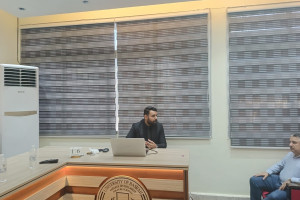
The College of Education for Pure Sciences, Department of Computer Science, University of Basra, discussed a master’s thesis on a powerful facial recognition system against aggressive attack using deep learning.
The message presented by the researcher (Ansam Kazem Abdel-Hadi) included
Face recognition is the technology that verifies or recognizes faces from photos, videos, or streams in real time. It can be used in employee attendance or security systems. Face recognition systems may encounter some attacks that reduce their ability to correctly recognize faces. So, many blurry images (blurred images) mixed with the original images lead to confusion in the results. Various attacks that exploit this vulnerability affect facial recognition systems such as Fast Gradient Sign Method (FGSM), Deep Fool, Projected Gradient Descent (PGD).
The proposed system was implemented in four stages:
First stage: The original images were obtained from the Labeled Faces in the Wild (LFW) database. Then the images were processed by Face Detection, Cropping and Resizing.
The second stage: the generation of hostile images. Three attacks were used to generate hostile examples: Deep Fool, FGSM and PGD attacks.
Phase Three: Feature Extraction The full-face feature extraction phase was done by using the Convolutional Neural Network (CNN) algorithm.
Fourth stage: The stage of classifying the original images from the hostile images.
The purpose of the message
To protect the face recognition system from these attacks by distorting the images through various attacks, then training the deep recognition network model, specifically the Convolutional Neural Network (CNN), using the original and distorted images and a high test accuracy of face recognition was obtained.
We concluded that our system improved the results with the highest accuracy rate when it was applied to five experiments and four tests.








